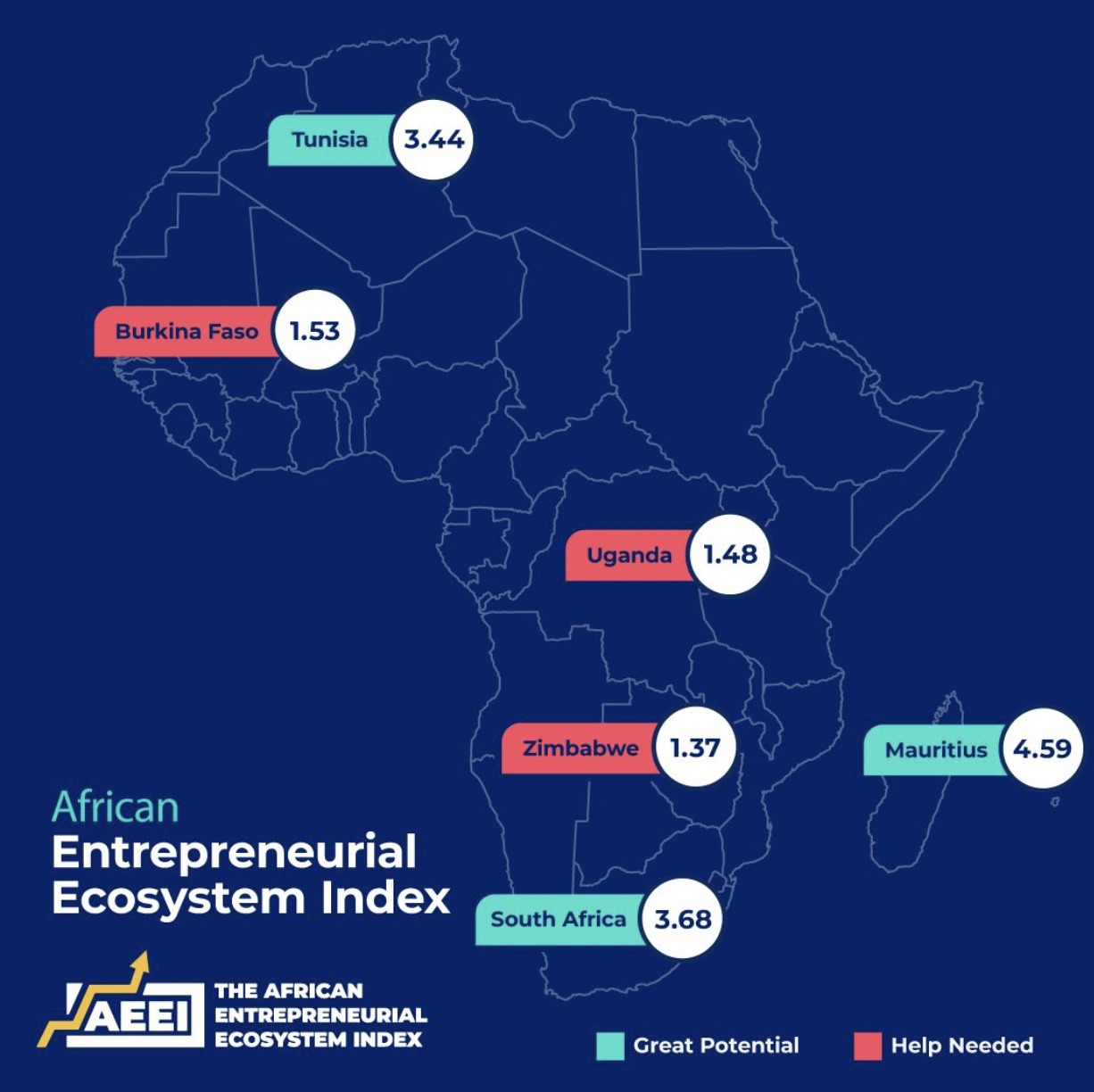
Mauritius, South Africa and Tunisia have the most promising entrepreneurial ecosystems out of 27 countries on the continent, according to the inaugural African Entrepreneurial Ecosystem Index – a new data-driven research tool launched at the GEN GEC + Africa entrepreneurship congress this month.
The African Entrepreneurial Ecosystem Index (AEEI), a new research tool that harnesses the power of big data to curate more accurate information about the state of entrepreneurship in Africa, is set to address critical gaps in African entrepreneurship ecosystems and power-up entrepreneurship on the continent.
The new Index, the result of a new partnership between the Allan Gray Centre for Africa Entrepreneurship (AGCAE) at Stellenbosch University, the i4Policy (Innovation for Policy Foundation), and Utrecht University, compares entrepreneurial ecosystems across 27 African countries for which data is available. It can be used to identify blind spots and offer guidance to policymakers and other actors in the ecosystem to target support where needed most to improve outcomes.
“The African Entrepreneurial Ecosystem Index is a gateway to better understanding entrepreneurial ecosystems,” says Dr Phumlani Nkontwana, Academic Director of the AGCAE. “Coupled with additional data-driven tools to gather and analyse information about entrepreneurs and their ventures, a clearer picture can be obtained of why so many entrepreneurs fail and where the big fault lines may lie in their local entrepreneurial ecosystem.”
Entrepreneurs are struggling across Africa. According to the 2023 Global Entrepreneurship Monitor South Africa (GEM SA), early-stage entrepreneurial activity has dropped to pre-pandemic levels in South Africa, for example. A struggling economy and a poor support network are cited as the key constraints holding back entrepreneurs. But better data could help to create a more precise picture of where the challenges lie, says Dr Nkontwana.
“We’ve got a data problem on this continent,” he explained at the congress. “This is why we have been working for years to generate venture and ESO data in some of the 27 countries covered by the new Index. The ambition has been to build longitudinal data sets through data engineering and study them over time to give us good insights into what is happening in entrepreneurial ecosystems across the continent.”
Some of the key emerging findings are surprising. For instance, some ventures can appear to be growing fast, while at the same time showing inherent weaknesses in their organisational structure, management practices or operational processes that could see them fail in the future. While this may sound like basic business science, the reality is that funders and ESOs struggle to get a good picture of holistic venture performance on time, which explains the pervasive failures.
In the first generation of the Index, Mauritius, South Africa and Tunisia are shown to have the most potential to drive productive entrepreneurship on the continent, with Zimbabwe and Uganda having the entrepreneurial ecosystems that need the most help. New tools were co-developed by researchers at the AGCAE to supplement the Index, including a micro diagnostic tool to generate, analyse and interpret venture performance. This tool rates ventures based on their evolutionary potential, management practices, innovation propensity, and operational capacity, giving a good indication of how likely they are to succeed and where potential problems lie.
The AEEI is constructed around societally relevant entrepreneurial ecosystem analytics and consists of seven challenge areas, each building on multiple data points.
The industry has welcomed the new Index. Itumeleng Dhlamini , Head of Programmes at SAB Foundation, said, “I am excited about this tool. It will give us answers. It is difficult often to establish how we are doing in the entrepreneurial space. I really think this could be a game changer.”
Lethabo Rampya, Head of Grant Making at the Allan & Gill Gray Philanthropies, agreed. “We need to know what the right level of support is to help business owners. We have to challenge ourselves to find out what we are funding and if the funds are going to the part of the company where it is needed the most.”
In his keynote address at the global entrepreneurship congress, Deputy President Paul Mashatile called for red tape to be eliminated to make it easier for start-ups and also said more investment was needed for start-up capital. “Africa has 18% of the world’s population but attracts only 2% of global capital and even less global venture capital for start-ups,” the deputy president said.
Better data is one way of unlocking investment in Africa, says Dr Nkontwana. The International Monetary Fund (IMF) has pointed out that investors need reliable data to test how specific investments fit into their strategic asset allocation models. “This is where the new African Entrepreneurial Ecosystem Index can change the game. We want to inspire data-driven dialogues where we make sense of the numbers and find solutions to the problems we are seeing.”
The AEEI with an interactive map can be viewed at https://africa.ecosystem.build/